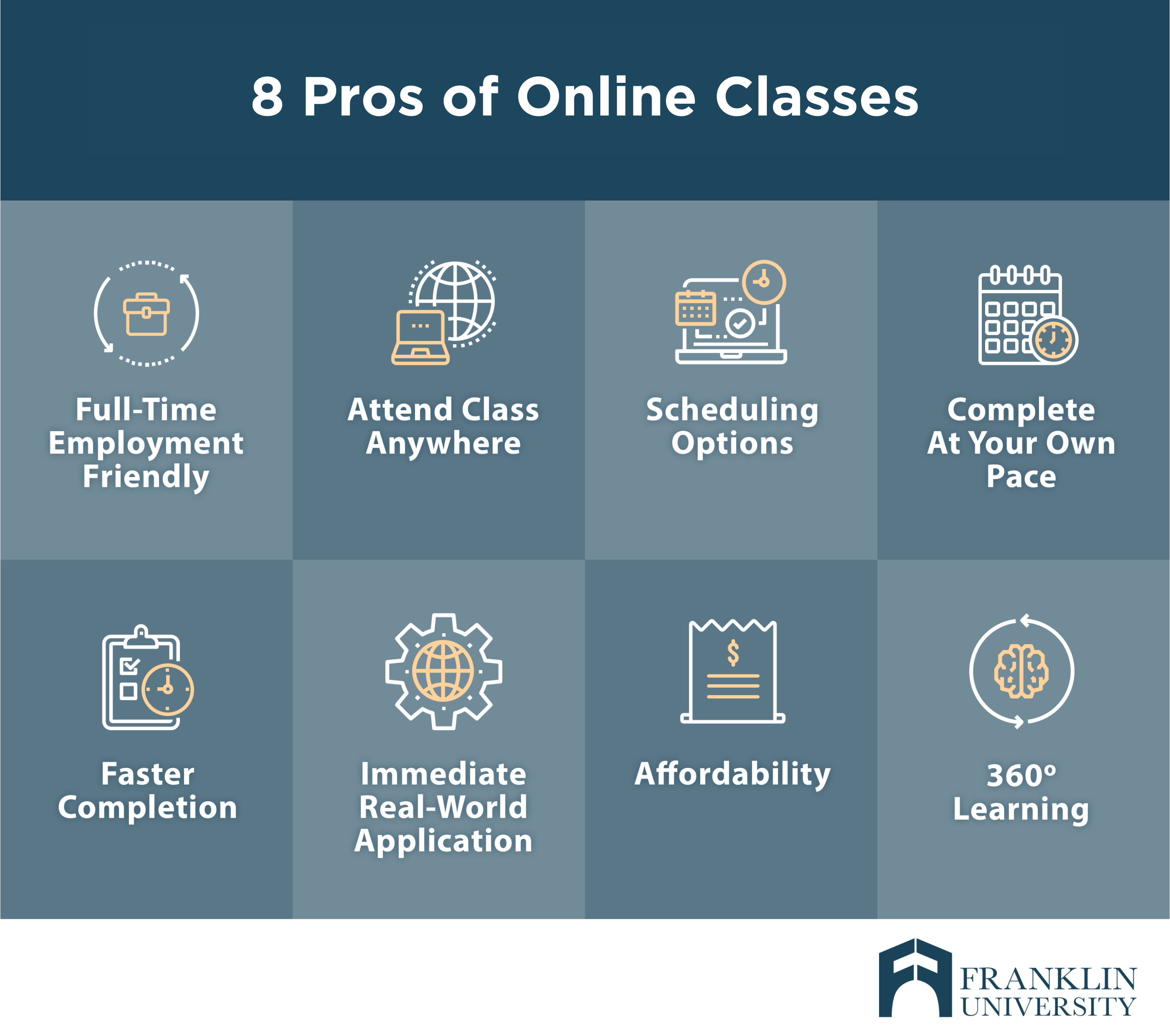Request Information
We're Sorry
There was an unexpected error with the form (your web browser was unable to retrieve some required data from our servers). This kind of error may occur if you have temporarily lost your internet connection. If you're able to verify that your internet connection is stable and the error persists, the Franklin University Help Desk is available to assist you at helpdesk@franklin.edu, 614.947.6682 (local), or 1.866.435.7006 (toll free).
Just a moment while we process your submission.

Online Classes vs. Traditional Classes: Pros, Cons & Challenges
You know the feeling of wanting to do something but also not wanting to get out of your PJs to do it? Yeah, we’ve all been there. That’s one of the reasons so many people prefer online classes over traditional, on-campus classes.
Of course, there’s more to the popularity of online classes than staying in your jammies.
According to labor market analytics firm Lightcast, 69% of all college degrees completed in 2021 were offered online. Even more astounding is the fact that from 2019 to 2021, there was an increase of 93.4% in the completion rates for online programs. Their traditional counterparts? They experienced a decrease of 8.7%.

When it comes to paying for school, grants are among your best options. But do you know how to find them? Remove the guesswork by downloading this free guide
Are Online Degree Programs Better?
This exponential growth in online degree programs is due, in part, to the convenience of high-quality online classes offered by institutionally accredited colleges and universities.
Of course, there are more benefits than the stay-in-your-pajamas convenience of online learning. So, before you decide whether an online degree is right for you, consider the benefits–and the drawbacks.
8 Pros of Online Classes
With advanced technologies, instructional design experts and dedicated online student support services, there’s never been a better time to take online classes.

1. More Accessible for Working Adults
The flexible nature of online learning is better suited to people who are working full time or part time. If physical attendance is required for some reason (though more often it is not), classes typically only meet once a week or so.
2. Attend-Class-Anywhere Convenience
Say goodbye to campus commutes. With online degree programs you can go to class in a coffee shop, at a park or on your couch. All you need is a Wi-Fi connection that lets you log in and learn from wherever you are.
3. Flexible Course Scheduling
Say “goodbye” to the traditional academic calendar. Online classes have their own rolling calendar. That means you won’t have to wait until the start of a semester to take your next class. Plus, rolling start dates and variable class lengths make it easier to fit school into your busy life.
4. At-Your-Own-Pace Classes
With online classes you can take one class at a time, double-up on classes or space your classes evenly through the year. This is especially helpful for those extra-busy times at work or when home obligations are a little too much. And because online classes usually start every six weeks, it’s pretty easy to speed up or slow down your classes to fit your schedule.
5. Accelerated Degree Completion
There are plenty of online degrees you can earn faster than a traditional degree. Online classes are more regularly available, which gives you more opportunities to take–and finish–more classes for more credits. This is particularly true of master’s degree programs, some of which can be completed in as few as 12 months.
6. Real-World Application
When you take online classes, there’s no waiting until the end of the term to see results. With online classes, you’re able to apply the concepts from your classes to your job. In other words, you can start putting theory into practice from the first day of class. In fact, some online students get promotion opportunities even before they finish their degree program simply because they’re demonstrating to their employer that they have and are developing in-demand skills and knowledge.
7. Lower Tuition Opportunities
While there’s no guarantee that an online education costs less than campus-based college classes, the cost per credit hour for online classes is often lower. The best online colleges can also help you maximize transfer credit. Not only will your previous education and experiences count toward your degree, transfer credit can help you save on tuition costs.
8. 360-Degree Learning Experience
Online classes are typically taught by instructors with deep and ongoing professional experience. Strategically designed course content is amplified by the real-world professional experiences of your instructors and peers, too. Traditional classes are often skewed toward a younger demographic and feature a more theory-driven approach taught by academic-focused professors.
5 (Potential) Cons of Online Classes
If you’ve never taken an online class before, it can take time to adjust to a virtual format. With a little planning, you just may find that the change isn’t as difficult as you thought.
1. Virtual Instead of Face-to-Face Interaction
Online classes inherently lack the spontaneous hallway discussions or office hours pop-ins of traditional classes. But that doesn’t mean there’s no facetime. On the contrary. The best online classes feature video chats, livestream classes and group projects to better connect you with your instructors and peers.
2. Networking and Internships Look Different
One of the best things about going back to college is growing your professional network and gaining hands-on experience. With online classes you may need to put in a little extra effort beyond the virtual classroom to connect with people in real life. Look for an online college that incorporates mentorship opportunities, supports your engagement with professional organizations, and connects you to a strong alumni and employer network.
3. Fewer Physical Perks
With online classes, it’s unlikely you’ll spend time lounging in the student union or hanging out in a quiet corner of the library. Oh, you’ll still have plenty of support; it’ll; just look a little different. The best online classes offer 24/7 access to library resources, tutoring services and virtual study rooms for peer-to-peer collaboration.
4. Self-Motivation Required
Daily or near-daily classes can make it easier to pace yourself with your coursework. When learning online, there are likely to be fewer checkpoints. Deadlines, too, may be spread out over time. But if you’re deadline driven, it’s pretty easy to set your own milestones. If you’re not, make a practice plan that includes a defined schedule and simple rewards to help you avoid procrastination.
5. No Class Confines to Stay Focused
It’s fairly easy to focus in a dedicated classroom surrounded by peers and instructors. While distractions in a remote learning environment can be a reality, the fix is pretty simple: Set up a dedicated space for your online learning and tell your friends and family to avoid interrupting you during class and study times.
Are Online Classes Right for Me?
Clearly, the growing popularity of online classes means there’s plenty of reasons to love them. Just remember that all online classes are not the same.
The college or university you choose for your online degree has a lot to do with the type of online learning experience you’ll have.
The good news is that with the right online classes, the pros definitely outweigh the potential cons. Even better? With online classes your student experience can be on par with—or better than—traditional in-person classes.





